Principal Investigator
Professor Chuixiang (Tree) Yi CV |
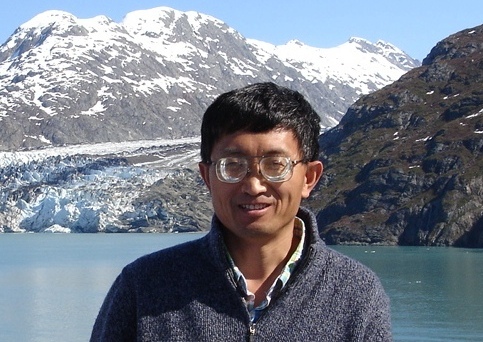 The overall goal of my research is to find links between carbon and climate: (1) seeking observational evidence of how climate controls terrestrial carbon sequestration from eddy-flux measurements; (2) modeling of how carbon dynamics changes climate through a climate-feedback model. On a large scale, my research group is trying to extract a simple picture (or theory) to understand the carbon-climate dynamics at biome level generally. On a small scale, my research group is focusing on turbulent transport processes of carbon, water, heat, and momentum over complex forested-terrain. Scientific problems my group is trying to solve include: (I) turbulent transport theory within a forest layer, which is a persistent knowledge gap because the classic theories do not work within canopies; (II) advection issues caused by complex terrain in eddy-flux measurements; (III) instability of forest flows over complex terrain; and (IV) land-surface parameterization of weather and climate models including vegetation-layer dynamics. In addition, my group is developing a nonlinear paleoclimate model to understand the nonlinear control mechanisms of abrupt climate change. The primary research approaches of my group are nonlinear dynamics, analytical modeling, numerical modeling, statistical modeling, and intensive field measurements. The overall goal of my research is to find links between carbon and climate: (1) seeking observational evidence of how climate controls terrestrial carbon sequestration from eddy-flux measurements; (2) modeling of how carbon dynamics changes climate through a climate-feedback model. On a large scale, my research group is trying to extract a simple picture (or theory) to understand the carbon-climate dynamics at biome level generally. On a small scale, my research group is focusing on turbulent transport processes of carbon, water, heat, and momentum over complex forested-terrain. Scientific problems my group is trying to solve include: (I) turbulent transport theory within a forest layer, which is a persistent knowledge gap because the classic theories do not work within canopies; (II) advection issues caused by complex terrain in eddy-flux measurements; (III) instability of forest flows over complex terrain; and (IV) land-surface parameterization of weather and climate models including vegetation-layer dynamics. In addition, my group is developing a nonlinear paleoclimate model to understand the nonlinear control mechanisms of abrupt climate change. The primary research approaches of my group are nonlinear dynamics, analytical modeling, numerical modeling, statistical modeling, and intensive field measurements. |
| |
Principal Investigator
Distinguished Professor George Hendrey |
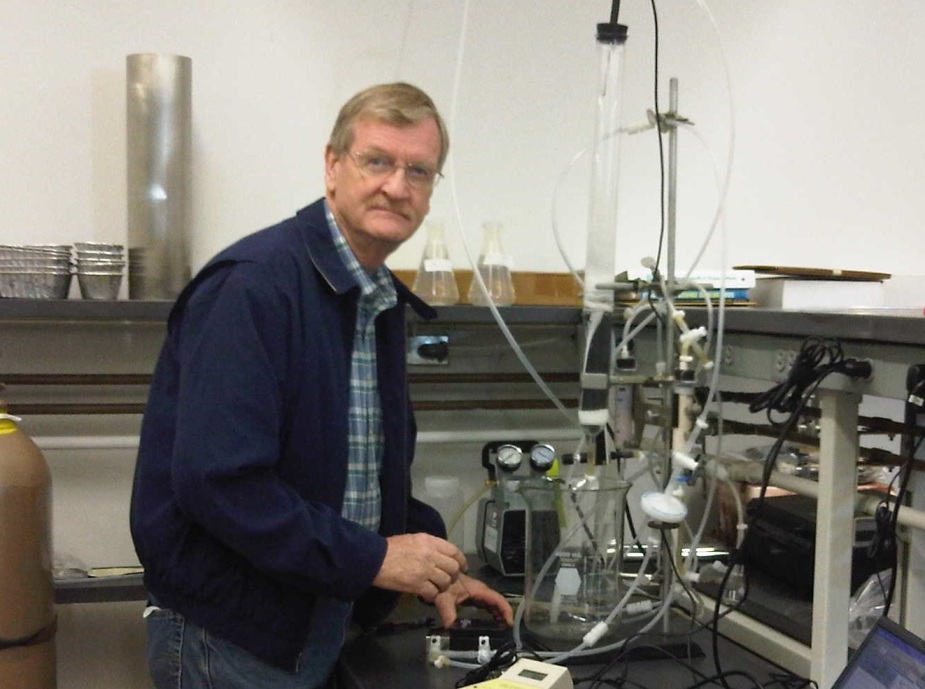 Forest-atmosphere CO2 exchange: Estimating net primary production via the eddy covariance flux method does not work well in hilly to mountainous terrain. Chuixiang Yi and I are setting up an experiment in the Black Rock Forest where we intend to develop methods to improve the use of eddy-flux to estimate NPP in complex terrain. We are establishing a suite of instrumented eddy-flux towers over a single hill for micrometeorological research on advective flux. CO2 absorption: An expanding area of interest for me is how inorganic substances react with atmospheric CO2. I have established an apparatus for studying such reactions and their associated kinetics. Plant responses to CO2 enrichment: Much of what is known about global ecosystem responses to future increases in atmospheric CO2 has been gained through Free-Air CO2 Enrichment (FACE) experiments of my design. All FACE experiments exhibit rapid variations in CO2 concentrations on the order of seconds to minutes. I have shown that long-term photosynthesis can be reduced as a consequence of this variability. Because of this, all FACE experiments tend to underestimate ecosystem net primary production (NPP) associated with a presumed increased concentration of CO2. I am working on development of a NPP correction based on photosynthesis experiments in which CO2 is oscillated in a controlled way in a leaf chamber while measuring photosynthetic fluorescence and/or CO2 assimilation. Forest-atmosphere CO2 exchange: Estimating net primary production via the eddy covariance flux method does not work well in hilly to mountainous terrain. Chuixiang Yi and I are setting up an experiment in the Black Rock Forest where we intend to develop methods to improve the use of eddy-flux to estimate NPP in complex terrain. We are establishing a suite of instrumented eddy-flux towers over a single hill for micrometeorological research on advective flux. CO2 absorption: An expanding area of interest for me is how inorganic substances react with atmospheric CO2. I have established an apparatus for studying such reactions and their associated kinetics. Plant responses to CO2 enrichment: Much of what is known about global ecosystem responses to future increases in atmospheric CO2 has been gained through Free-Air CO2 Enrichment (FACE) experiments of my design. All FACE experiments exhibit rapid variations in CO2 concentrations on the order of seconds to minutes. I have shown that long-term photosynthesis can be reduced as a consequence of this variability. Because of this, all FACE experiments tend to underestimate ecosystem net primary production (NPP) associated with a presumed increased concentration of CO2. I am working on development of a NPP correction based on photosynthesis experiments in which CO2 is oscillated in a controlled way in a leaf chamber while measuring photosynthetic fluorescence and/or CO2 assimilation. |
|
Professor John Wolbeck
Ph.D. Student |
 John Wolbeck is pictured here test driving an electric/solar car that he and his students built. The car is capable of traveling 50 mph for 40 minutes on a single charge (unfortunately it does not have much room for luggage). His students have recently began construction on a solar powered motorboat. John races Sunfish sailboats in the summer and has a "renegade" iceboat that he sails on the ice in the winter. The iceboat can reach speeds of 100 mph! Given his background it is only logical that his research interests involve understanding the complex relationships of wind and our environment. His fluid mechanics and instrumentation experience is being put to use at the Black Rock Forest eddy flux Tower site for "understanding canopy flows over complex terrain" and for modeling and predicting the s-shaped canopy velocity profile under differing synoptic conditions using canopy momentum transfer theory CMT. John Wolbeck is a NYS licensed Professional Engineer P.E. He earned his Bachelors degree in Mechanical Engineering from UB, (State University at Buffalo), and his Masters degree in Environmental Engineering from Manhattan College. John teaches; Engineering Statics, Dynamics, Solid Mechanics, Physics, and Astronomy at SUNY Orange Community College where he is the Chair of the Department of Science and Engineering. John Wolbeck is pictured here test driving an electric/solar car that he and his students built. The car is capable of traveling 50 mph for 40 minutes on a single charge (unfortunately it does not have much room for luggage). His students have recently began construction on a solar powered motorboat. John races Sunfish sailboats in the summer and has a "renegade" iceboat that he sails on the ice in the winter. The iceboat can reach speeds of 100 mph! Given his background it is only logical that his research interests involve understanding the complex relationships of wind and our environment. His fluid mechanics and instrumentation experience is being put to use at the Black Rock Forest eddy flux Tower site for "understanding canopy flows over complex terrain" and for modeling and predicting the s-shaped canopy velocity profile under differing synoptic conditions using canopy momentum transfer theory CMT. John Wolbeck is a NYS licensed Professional Engineer P.E. He earned his Bachelors degree in Mechanical Engineering from UB, (State University at Buffalo), and his Masters degree in Environmental Engineering from Manhattan College. John teaches; Engineering Statics, Dynamics, Solid Mechanics, Physics, and Astronomy at SUNY Orange Community College where he is the Chair of the Department of Science and Engineering. |
| |
Xiyan Xu
Ph.D. Candidate |
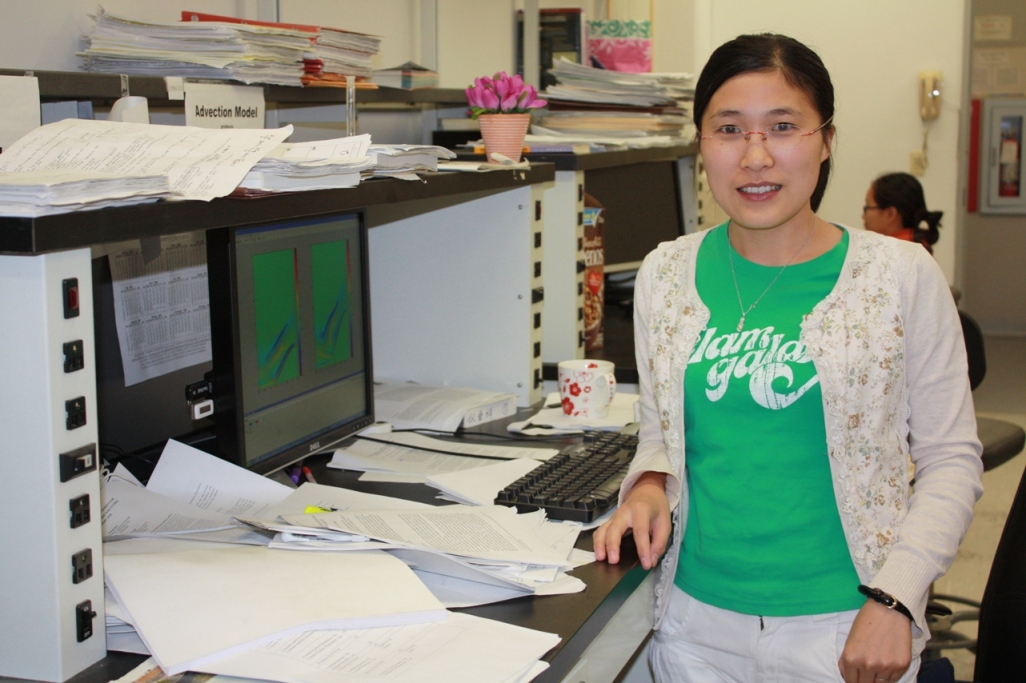 I received a B.S. from Nanjing Institute of Meteorology. Now my interests focus on seeking numerical solutions for CO2 transfer within canopy layer over complex terrain. Heterogeneity in flow and CO2 distribution cannot be properly accounted for by one dimensional tower-based eddy covariance technique, causing significant uncertainties in evaluating net ecosystem exchange of CO2 (NEE) in calm nights. I am using CFD method to solve the spatial and temporal evolution for both flow and CO2 transfer within canopy layer over complex terrain. I received a B.S. from Nanjing Institute of Meteorology. Now my interests focus on seeking numerical solutions for CO2 transfer within canopy layer over complex terrain. Heterogeneity in flow and CO2 distribution cannot be properly accounted for by one dimensional tower-based eddy covariance technique, causing significant uncertainties in evaluating net ecosystem exchange of CO2 (NEE) in calm nights. I am using CFD method to solve the spatial and temporal evolution for both flow and CO2 transfer within canopy layer over complex terrain. |
| |
Suhua (Sue) Wei
Ph. D. Student |
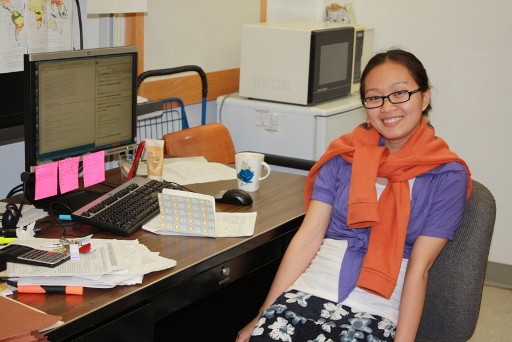 I received my B.S in physics from Beijing Normal University in July, 2010. Now I am working with Professor Yi to do research on biosphere-atmosphere interaction. My research focuses on synthetic analysis of FLUXNET data to understand global CO2 cycle and how future climate change affects terrestrial CO2 exchanges with atmosphere in 21st Century. The long-term goal of my research is using remote sensing and GIS to upscale tower CO2 measurements to national scales. I received my B.S in physics from Beijing Normal University in July, 2010. Now I am working with Professor Yi to do research on biosphere-atmosphere interaction. My research focuses on synthetic analysis of FLUXNET data to understand global CO2 cycle and how future climate change affects terrestrial CO2 exchanges with atmosphere in 21st Century. The long-term goal of my research is using remote sensing and GIS to upscale tower CO2 measurements to national scales. |
| |
Christine Ramadhin
Ph.D. Student |
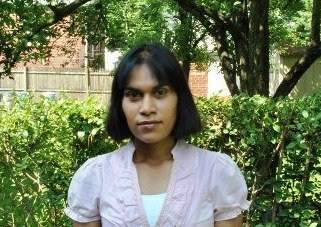 My undergrad degrees were in Chemistry and Environmental Science. While working on my Chemistry degree, I developed a strong interest in using scientific principles to develop comprehensive protocols in monitoring and solving environmental problems. Currently, I am working with Professor Chuixiang (Tree) Yi to investigate the paleo-climate data to help explain and predict current and future climate change. There are more than one drivers (CO2, solar insolation, and others) responsible for climate change and it should prove interesting to definitely determine which one is most responsible for drastic changes in global climate. My undergrad degrees were in Chemistry and Environmental Science. While working on my Chemistry degree, I developed a strong interest in using scientific principles to develop comprehensive protocols in monitoring and solving environmental problems. Currently, I am working with Professor Chuixiang (Tree) Yi to investigate the paleo-climate data to help explain and predict current and future climate change. There are more than one drivers (CO2, solar insolation, and others) responsible for climate change and it should prove interesting to definitely determine which one is most responsible for drastic changes in global climate. |
| |
Caroline Farkas
Master Student |
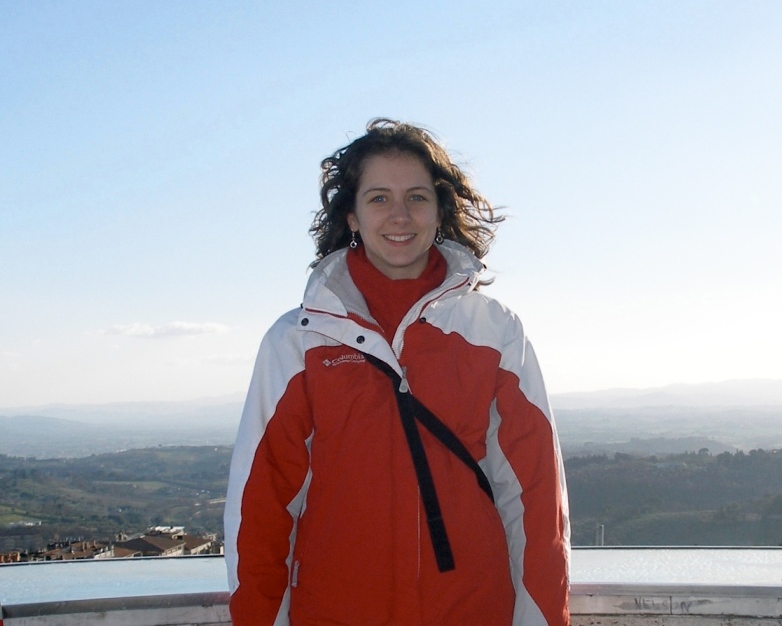 I graduated from North Carolina State University with a B.S. in Meteorology. I recently completed an internship at Wageningen University in the Netherlands doing research on the effects of urbanization on the local temperature in an area called the Randstad. Using the Weather Research and Forecast (WRF) model, I studied the temperature data of a specific heat wave using different degrees of land use, including a future scenario. I also started to research possible changes to a city to help reduce the temperature during the summer by a small amount. My interests in the atmospheric sciences are broad and diverse and right now I am really interested in climate research! I graduated from North Carolina State University with a B.S. in Meteorology. I recently completed an internship at Wageningen University in the Netherlands doing research on the effects of urbanization on the local temperature in an area called the Randstad. Using the Weather Research and Forecast (WRF) model, I studied the temperature data of a specific heat wave using different degrees of land use, including a future scenario. I also started to research possible changes to a city to help reduce the temperature during the summer by a small amount. My interests in the atmospheric sciences are broad and diverse and right now I am really interested in climate research! |
|
|
Alan Mason
Master Student |
 I received my B.S. in Environmental Science from Monash University, Australia in 2002. I am currently pursuing a M.S. in Applied Environmental Geoscience, and working with Professor Yi analyzing FLUXNET data in order to quantify current and future CO2 changes due to variations in climate. I am extremely interested in the tower instrumentation utilized in data collection, as I believe an enhanced understanding of these tools will augment my analytic capabilities regarding climate data. With the knowledge gleaned from these studies, I believe we will be able to provide objective explanations for carbon flux and other climate phenomena. I received my B.S. in Environmental Science from Monash University, Australia in 2002. I am currently pursuing a M.S. in Applied Environmental Geoscience, and working with Professor Yi analyzing FLUXNET data in order to quantify current and future CO2 changes due to variations in climate. I am extremely interested in the tower instrumentation utilized in data collection, as I believe an enhanced understanding of these tools will augment my analytic capabilities regarding climate data. With the knowledge gleaned from these studies, I believe we will be able to provide objective explanations for carbon flux and other climate phenomena. |
| |
Anand Dookie
Undergraduate Student |
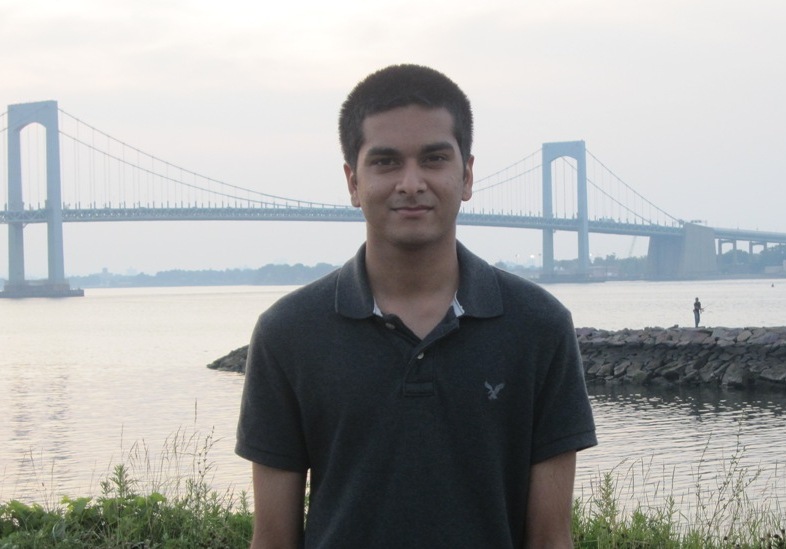 I am currently a freshman at The City University of New York, Queens College studying Physics and Geology. My greatest interest lies in the fields of climatology and meteorology. Currently, I am doing research on atmosphere-biosphere interaction in Dr. Yi's Lab based on AmeriFlux datasets. While researching with Dr. Yi, I hope to gain an in-depth understanding of professional level research. I am currently a freshman at The City University of New York, Queens College studying Physics and Geology. My greatest interest lies in the fields of climatology and meteorology. Currently, I am doing research on atmosphere-biosphere interaction in Dr. Yi's Lab based on AmeriFlux datasets. While researching with Dr. Yi, I hope to gain an in-depth understanding of professional level research. |
| |
|
Max Wang
High School Student
|
 I am a sophomore, going to be junior this fall, at Stuyvesant High School. I have a love for science and am interested in physics and math. I am volunteering at Professor Chuixiang Yi's lab for the summer. I hope to assist in any way I can and to learn something from this experience. I am a sophomore, going to be junior this fall, at Stuyvesant High School. I have a love for science and am interested in physics and math. I am volunteering at Professor Chuixiang Yi's lab for the summer. I hope to assist in any way I can and to learn something from this experience. |
| |
|
Chun Wu
High School Student
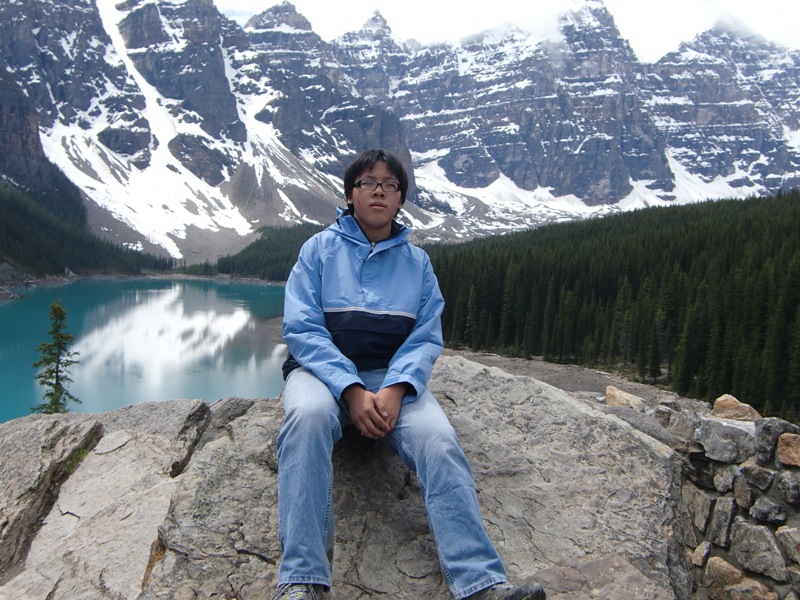 I am a junior at Forest Hills High School. I love math and any kind of science because it helps me understand the things around me. Helping Professor Chuixiand Yi's research project gives me an idea of how professional scientists would work. I wish I can learn more about the environment and save this knowledge for future use. I am a junior at Forest Hills High School. I love math and any kind of science because it helps me understand the things around me. Helping Professor Chuixiand Yi's research project gives me an idea of how professional scientists would work. I wish I can learn more about the environment and save this knowledge for future use.
|
| |